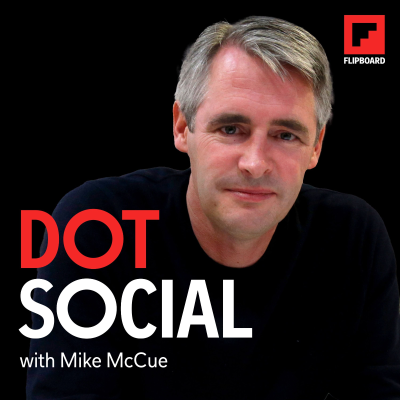
Dot Social
Englisch
Kostenlos bei Podimo
Kostenlos hören bei Podimo
Starte jetzt und verbinde dich mit deinen Lieblingspodcaster*innen
- Vertraut von über 1 Mio. deutschen Hörer*innen
- Über 1.000 lokale Podcasts und Shows – nur bei Podimo
- Keine Zahlung nötig
Mehr Dot Social
Learn about the Internet’s next wave on the open social web and what it will unlock for how we connect, communicate, and innovate online. Hosted by Flipboard CEO Mike McCue.
Alle Folgen
23 FolgenRediscovering the Magic of the Blogosphere, with John O’Nolan and Matthias Pfefferle
Social networks were built on short posts designed for speed and scale. But what if the next era of the web was built for something deeper? Two of the social web’s “longformers” are working on this. John O’Nolan, the founder and CEO of Ghost, and Matthias Pfefferle, the developer behind the ActivityPub plugin for WordPress, are at the forefront of integrating social features with blogs, newsletters, essays — anything that doesn’t fit in a box of 500 characters or less. In this episode of Dot Social, the trio talks about rediscovering the magic of the blogosphere; why formatting, identity, and interoperability are tricky problems to solve; and where writing belongs in the next chapter of the internet. Highlights include: * Importance to writers and bloggers * Models for discovery * Core principles around bringing long-form to the social web * Lessons from Web 2.0, email * Rough edges and need for collaboration Mentioned or related to this episode: * Julian Lam of Node BB [https://nodebb.org/] * “Digital Sovereignty Is the New Influencer Status, with Citation Needed's Molly White [https://dot-social.simplecast.com/episodes/molly-white-sxsw]” * “Steps Forward in Long-form Tex [https://socialwebfoundation.org/2025/05/01/steps-forward-in-long-form-text/]t” 🔎 You can find John at https://john.onolan.org/ [https://john.onolan.org/] and Matthias at https://pfefferle.dev/ [https://pfefferle.dev/] ✚ You can connect with Mike McCue at @mmccue.bsky.social [https://bsky.app/profile/mmccue.bsky.social]. 🌊 Catch the wave! Surf the social web and create your own custom feeds at surf.social [http://surf.social/], a new beta from the people at Flipboard. https://about.surf.social/ [https://about.surf.social/]
Digital Sovereignty Is the New Influencer Status, with Citation Needed's Molly White
Thanks to the rise of the open social web, it’s more viable than ever for creators to take back ownership and control of the distribution of their work, their connection to their audiences, and their livelihoods overall. Real alternatives to walled-garden platforms aren’t just theoretical ideas — they’re here, and getting stronger every day. No one knows this better than Molly White [https://www.mollywhite.net/], the researcher, writer and software engineer behind the Citation Needed newsletter [https://www.citationneeded.news/] and the project Web3 Is Going Just Great [https://www.web3isgoinggreat.com/]. Molly’s not only an outspoken advocate for an open, ethical web, she’s also cracked the code on being a successful, autonomous creator herself. During this conversation with Flipboard CEO Mike McCue, recorded live at SXSW 2025 [https://schedule.sxsw.com/2025/events/PP147154] on March 9, 2025, White explains her setup, philosophy, and learnings, and takes smart questions from the audience at the end. Highlights include discussions of: * Importance of owning your online identity * Strategies for digital ownership * Moving content freely without platform constraints * Monetization and sustainable models * Video content, e-commerce, surveillance capitalism Mentioned in this episode: * Ghost [https://ghost.org/] * Cory Doctorow’s talk, “Tensions in Creative Labor & Generative AI [https://schedule.sxsw.com/2025/events/PP149418]” 🔎 You can find Molly at mollywhite.net [http://mollywhite.net]. ✚ You can connect with Mike McCue at @mike@flipboard.social [mike@flipboard.social] and @mmccue.bsky.social [https://bsky.app/profile/mmccue.bsky.social]. 🌊 Catch the wave! Surf the social web and create your own custom feeds at surf.social [http://surf.social/], a new beta from the people at Flipboard: https://about.surf.social/ [https://about.surf.social/]
Architecting a New Era of Community, with Blacksky’s Rudy Fraser
What if your social media experience weren’t controlled by an algorithm or a corporation, but by your community? That’s the idea behind Blacksky, a decentralized project built on the AT Protocol — the same infrastructure powering Bluesky. Though their names contain the same suffix, it’s important to know that Blacksky is not hitching its wagon to the Bluesky app, team or platform. The community, helmed by founder and CEO Rudy Fraser, is charting an independent and ideally replicable path, the kind that’s only possible in an open-source ecosystem. In this episode of Dot Social, Fraser takes host Mike McCue under the hood of Blacksky’s infrastructure, philosophy, and future plans. Highlights include discussions of: * Mutual aid and community building * The value of portable identity * Lessons from running Blacksky so far * Moderation, tools and business models * Building for longevity Mentioned in this episode: * Rudy’s ATmosphere conference talk, “Beyond Horseless Carriages”: https://www.youtube.com/watch?v=OZN8y8kVFFI [https://www.youtube.com/watch?v=OZN8y8kVFFI] * Rudy’s blog post, “An internet of many autonomous communities”: https://blog.rudyfraser.com/an-internet-of-many-autonomous-communities/ [https://blog.rudyfraser.com/an-internet-of-many-autonomous-communities/] * Blacksky Labeler: https://bsky.app/profile/did:plc:d2mkddsbmnrgr3domzg5qexf [https://bsky.app/profile/did:plc:d2mkddsbmnrgr3domzg5qexf] * Cypher: https://github.com/blacksky-algorithms/rsky/tree/main/cypher [https://github.com/blacksky-algorithms/rsky/tree/main/cypher] * Rsky-Relay: https://github.com/blacksky-algorithms/rsky/pull/87 [https://github.com/blacksky-algorithms/rsky/pull/87] * SAFEskies: https://github.com/blacksky-algorithms/SAFEskies [https://github.com/blacksky-algorithms/SAFEskies] * New Yorker article mentioning Rudy: https://www.newyorker.com/magazine/2025/04/14/blueskys-quest-to-build-nontoxic-social-media [https://www.newyorker.com/magazine/2025/04/14/blueskys-quest-to-build-nontoxic-social-media] 🔎 You can find Rudy at @rudyfraser.com [http://rudyfraser.com]. ✚ You can connect with Mike McCue at @mmccue.bsky.social [https://bsky.app/profile/mmccue.bsky.social]. 🌊 Catch the wave! Surf the social web and create your own custom feeds at surf.social [http://surf.social/], a new beta from the people at Flipboard. https://about.surf.social/ [https://about.surf.social/]
Move Fast and Break Kings, with Cory Doctorow
Blogger, journalist, author and activist Cory Doctorow can embark on a 10-minute monologue about what’s wrong with tech and still leave you hungering for more of his rapid-fire analysis and biting humor. It’s stunning to be presented with the big picture of the mess we’re in — and how to potentially get out of it. In this episode of Dot Social, recorded live at the Fediverse House at SXSW 2025, Doctorow unpacks the concept of “enshittification.” It’s a term he coined to show how we got to this place where platforms prioritize business interests over user experience, leading to tragic declines in quality and trust. He talks about how to challenge platform monopolies and the importance of true federation. Highlights include discussions of: * The internet’s evolution and its current state * The cycle of platform abuse * The role of competition and regulation * Benefits of RSS and the social web * Cory’s new book, “Picks and Shovels” 🔎 You can find Cory at @pluralistic@mamot.fr ✚ You can connect with Mike McCue at @mike@flipboard.social 🌊 Catch the wave! Surf the social web and create your own custom feeds at surf.social [http://surf.social/], a new beta from the people at Flipboard. https://about.surf.social/ [https://about.surf.social/]
Creating an ATmosphere of Possibility, with Bluesky’s Paul Frazee
From the outside, Bluesky may seem like a Twitter clone. But anyone who’s close to the technology — and the team — knows that they’re building something much deeper: they’re rethinking the internet’s architecture to create a more flexible, user-centric web. Bluesky’s CTO Paul Frazee [https://bsky.app/profile/pfrazee.com] is the perfect person to explain all this, as he’s fantastic at tying technical concepts to their practical application and wider impact. In this interview with Mike McCue, recorded live at the Fediverse House at SXSW 2025 [https://about.flipboard.com/fediverse/fediverse-house-2025/], Frazee unpacks Bluesky’s first principles, what makes AT Protocol different from ActivityPub, why identity portability is a radical shift, and how decentralization could lead to more humane social spaces. Other highlights include: * Bluesky's growth spike and architecture first principles * The challenges of bridging between federated networks * What it means to build for composability * How stackable moderation works * Paul's take on full federation * Why this is a greenfield moment for developers * Bridging cultural echo chambers Mentioned in this episode: * Beaker Browser post-mortem [https://github.com/beakerbrowser/beaker/blob/master/archive-notice.md] 🔎 You can find Paul on Bluesky @pfrazee.com [http://pfrazee.com]. ✚ You can connect with Mike McCue all across the social web, including on Bluesky @mmccue.bsky.social [https://bsky.app/profile/mmccue.bsky.social]. 🌊 Catch the wave! Surf the social web and create your own custom feeds at surf.social [https://surf.social/], a new beta from the people at Flipboard: https://about.surf.social/ [https://about.surf.social/]















































